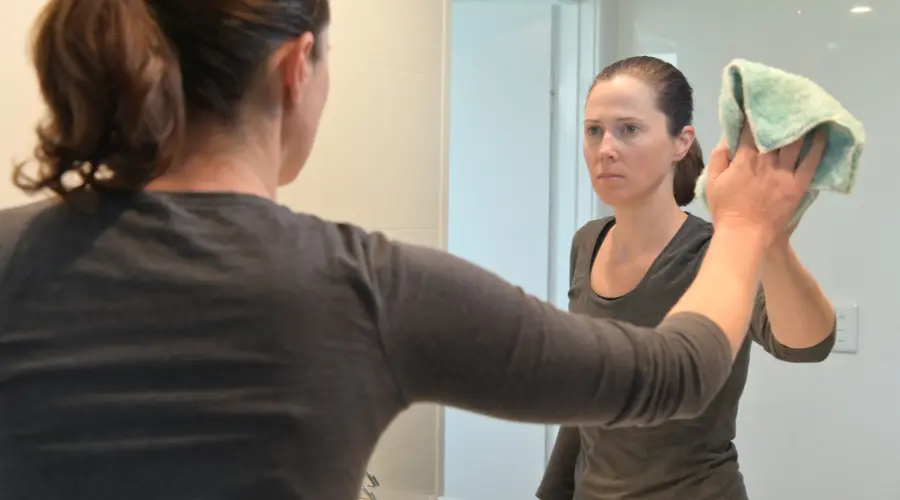Understand Disruptive Thought Patterns and Get Support
Both impulsive and intrusive thoughts can cause challenges in your everyday life, but they are not the same.
Despite having different root causes and consequences, they can get confused
easily. Treatment can help you manage intrusive and impulsive thoughts.
When you seek professional help, it’s integral that you find a treatment facility or provider that uses the most evidence-based approaches for the root cause of your intrusive or impulsive thoughts.
Learning more about intrusive vs impulsive thoughts and their possible causes can be a valuable first step to finding the kind of support you need.
This article from our clinical team at South Shores will give you a detailed overview of the difference between impulsive vs. intrusive thoughts, the conditions that can lead to both of these types of thoughts and treatment.
The Difference Between Intrusive and Impulsive Thoughts
An example of an impulsive thought would be, “I want to cut my hair right now.” You may not have wanted to cut your hair the day before or at all until the present moment. Now, upon having that thought, you have a strong urge. Unmanaged impulsive thoughts tend to lead to spontaneous or reckless actions without consideration of the possible consequences.
While impulsivity can be a problem, an impulsive thought isn’t the same as an intrusive thought. Understanding the difference between intrusive vs. impulsive thoughts can help you describe what you’re going through to other people, like a mental health professional.
Intrusive thoughts are unwanted thoughts that can be disturbing. An intrusive thought could be a sentence, like “My mom will die if I touch that,” an image or visual memory, or an anxiety-provoking question, like “What if I left the stove turned on? What if my apartment building burns and my cat dies?”
What are Intrusive Thoughts a Symptom Of?
Intrusive thoughts can be a symptom of multiple mental health conditions. Obsessive-compulsive disorder is one of the conditions most commonly associated with intrusive thoughts.
Obsessive-compulsive disorder, in fact, is characterized by recurring thoughts that are unwanted, distressing, or intrusive, paired with mental or physical compulsions.
Intrusive Thoughts in Obsessive-Compulsive Disorder (OCD)
Intrusive thoughts can come in different forms. With OCD, they may include unwanted sexual thoughts, fears of hurting others, anxiety related to contamination or cleanliness, questioning of a healthy romantic relationship, or something else, depending on the way your OCD manifests.
Examples of OCD-related intrusive thoughts include:
- “I should drop the baby right now.”
- “What if I sent that picture to the wrong person?”
- “What if I jumped in front of that train right now?”
- “I need to check if I left the coffee pot on, or else the house could burn down.”
- “I need to put things in front of the door, or else someone could break in, and I won’t hear it.”
- “If I touch the sink, I will get sick with an infection.”
- “My luggage from the airport will contaminate the rest of my home.”
- “I want to touch that hot stove.”
A person with OCD might have thoughts like “What if I left the coffee/tea pot on?” even if they’ve already checked and found that they did not leave it on. This is why intrusive thoughts can lead to compulsions like checking behaviors (e.g., checking the door to ensure it is locked).
In the case of an intrusive thought like, “I should drop the baby,” this reflects an action the person would never actually take.
As you might imagine, unwanted thoughts like these can lead to significant anxiety, guilt, shame, fear, confusion, and upset.
Other Mental Health Conditions and Intrusive Thoughts
While intrusive thoughts are often associated with obsessive-compulsive disorder, they can stem from other mental health conditions. Anxiety disorders like generalized anxiety disorder or social anxiety disorder can cause unwanted thoughts that negatively impact your life.
The same is true for trauma disorders like post-traumatic stress disorder (PTSD) or complex PTSD.
In PTSD, someone may experience a jarring memory of a traumatic event or a fear related to a traumatic event they’ve been through. For example, if you were in a car crash, you might have an intrusive thought where you see headlights coming straight toward you.
With social anxiety disorder (social phobia), you could experience intrusive thoughts like, “What if I call and the receptionist gets mad at me?” “What if everyone secretly hates me?” or “What if I embarrass myself in front of all my friends?”
How Intrusive and Impulsive Thoughts Both Intersect With Substance Addiction
Emotionally, intrusive thoughts can be very difficult to handle. If you have intrusive thoughts, you may feel significant distress or guilt. While these feelings are common, there is nothing to be ashamed of. Still, without adequate mental health support, you might turn to substances to cope.
Impulsivity can also intersect with substance addiction. If you struggle with impulse control, you might not yet have the tools necessary to stop yourself from acting on impulses like drinking or using drugs in daily life.
Developing self-awareness and establishing healthier coping mechanisms in treatment can help. These are just two ways treatment can support you.
How South Shores Detox and Recovery Can Help With Intrusive Thoughts
Whether impulsive or intrusive thoughts are what’s affecting your life negatively, the mental health professionals at South Shores Detox are here for you.
Residential inpatient and outpatient treatment programs are available at our facility, which offers the following specialized services for you or your loved one experiencing intrusive thoughts.
Our team can help you determine whether an inpatient or outpatient program is the right choice for you.
Comprehensive Evaluations and Assessments
South Shores provides comprehensive evaluations and assessments. Through the assessments we offer, a mental health provider can help determine whether it is intrusive or impulsive thoughts you’re experiencing.
This will lead you to the right diagnosis and treatment plan.
Customized Therapy Programs
After pinpointing the root cause of your intrusive thoughts, we’ll work with you to make a customized treatment plan. Different types of therapy can be used to address specific mental health or related disorders.
ERP and Other Therapies for OCD
A type of therapy called exposure and response prevention (ERP) therapy is one of the leading treatments for OCD. Derived from cognitive behavioral therapy, ERP helps you withstand intrusive thoughts without engaging in compulsive behaviors. In time, your emotional response to triggers will lower.
Creative therapies, experiential therapies, cognitive therapy, psychoeducation, and other approaches may be used in our programs, too.
Trauma-Focused Therapies
Trauma-focused therapies are important for people who have been through past trauma. These include but aren’t restricted to trauma-focused cognitive behavioral therapy (TF-CBT), prolonged exposure therapy, eye movement desensitization and reprocessing (EMDR), and cognitive processing therapy work.
Mental Health Medication
Medications can be helpful for people with mental health conditions like OCD, PTSD, or anxiety.
We provide medication management in addition to therapy. Selective serotonin reuptake inhibitors and serotonin and norepinephrine reuptake inhibitors, for example, can benefit people with OCD and other disorders that might lead to intrusive thoughts, like anxiety disorders.
Development of Coping Skills
Therapies like dialectical behavior therapy (DBT) are used in our programs to help you learn how to slow down, notice your thoughts mindfully, and implement coping skills that work for you.
Mindful breathing, radical acceptance, and Temperature, Intense Exercise, Paced Breathing, and Progressive Muscle Relaxation (TIPP) skills are some examples of coping strategies you might learn about in DBT.
Dual-Diagnosis Treatment
People who have mental health conditions, including OCD, are at a higher risk for substance abuse. If you have a mental health disorder and substance use disorder, South Shores Detox is an ideal choice for treatment.
By addressing addiction and any co-occurring conditions, our team will help you get to a place where your overall physical and mental well-being is cared for. We offer medically supervised detox for dual-diagnosis clients who might need help getting off of substances before entering an inpatient or outpatient therapy program at our center.
Planning for Life After Formal Treatment
You will learn a lot about how to manage intrusive thoughts while in treatment. Aftercare planning can be a critical part of helping you continue to heal and maintain relief following a formal treatment program.
We often recommend continued professional help in the form of therapy and medication management. Coping skills, job and education help, a crisis plan, and support groups are some other examples of what your aftercare plan could entail.
Managing Impulsive Thoughts Through Treatment
If you have consistent impulsive (not intrusive) thoughts, it is possible that you could have a condition like attention-deficit hyperactivity disorder (ADHD). Like many mental health conditions, ADHD can increase the risk of substance abuse.
Impulsive behaviors and thoughts can also be linked to some mental health disorders. For example, borderline personality disorder (BPD) and bipolar disorder–specifically, bipolar disorder during episodes of mania or hypomania–can come with impulsivity.
Treatment can help you address impulsive thoughts and their underlying causes, just like it can help you manage intrusive thoughts. If you struggle with sudden urges and impulsivity as opposed to intrusive thoughts, our team is here.
Get Treatment for Intrusive Thoughts at South Shores
Whether you’re experiencing intrusive or impulsive thoughts, seeking professional treatment from providers who understand and can address the root cause matters. Please get in touch with South Shores today for help with intrusive thoughts and other symptoms.
Just call our admissions line to connect with our team. Feel free to contact South Shores Detox for yourself or a loved one seeking mental health support for intrusive and impulsive thoughts.
FAQs Regarding Intrusive vs Impulsive Thoughts
What is the difference between impulsive and intrusive thoughts?
Unlike intrusive thoughts, impulsive thoughts are sudden urges to engage in impulsive actions. Often, impulsive thoughts lead to risky behaviors and negative consequences if the person acts on them.
Not everyone will know how to stop themselves from participating in spontaneous actions resulting from impulsive thoughts (e.g., “quit your job” or “have a drink”) without professional help. Treatment can help you identify and curb intrusive thoughts, creating a space between the urge and your personal behavior.
What is an example of an intrusive thought?
An example of an intrusive thought is, “What if I sent that text to the wrong person?” or “What if I lean over and shove my sister in front of the car?”
These unwanted ideas are jarring, but they aren’t your fault. Having them does not mean that you’ll act on them or that you are a bad person.
What is the meaning of intrusive thoughts?
Intrusive thoughts are unwanted, involuntary thoughts or mental images that are disruptive or distressing. They are called intrusive thoughts because they intrude on what you really think, want to do, or know.
What is the difference between intrusive and real thoughts?
Let’s say that you have an intrusive thought about harming your child. However, harming your child is not something you want to do–you’re actually terrified by the thought. Intrusive thoughts like these differ from real thoughts because they do not reflect your deliberate thought process.
They’re automatic, so you will only be able to consider them and how you feel about them after they pop into your head.
Intrusive thoughts can also manifest in images or fears (e.g., “What if I said something embarrassing?”). You can think of intrusive thoughts as thoughts that are in your brain but do not belong to or reflect you.





